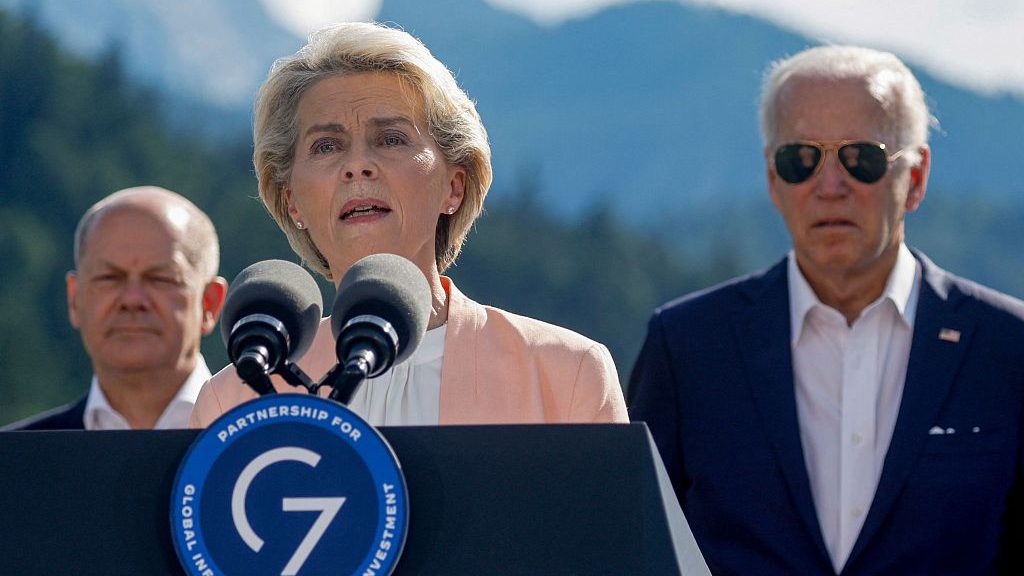
European Commission President Ursula von der Leyen speaks next to German Chancellor Olaf Scholz and U.S. President Joe Biden during the first day of the G7 leaders' summit held at Elmau Castle, southern Germany, June 26, 2022. /VCG
European Commission President Ursula von der Leyen speaks next to German Chancellor Olaf Scholz and U.S. President Joe Biden during the first day of the G7 leaders' summit held at Elmau Castle, southern Germany, June 26, 2022. /VCG
Editor's note: Freddie Reidy is a freelance writer based in London. He studied history and history of art at the University of Kent, Canterbury, specializing in Russian history and international politics. The article reflects the author's opinions, and not necessarily the views of CGTN.
The Group of Seven (G7) announced on Monday a new raft of sanctions against Russia in response to the Ukraine crisis. These additional sanctions are designed to limit foreign capital from entering the Russian economy. Among the sanctions announced in a joint statement was a ban on the import of Russian gold. Will this new set of sanctions make a difference though?
What became apparent in this latest announced package is the constraining impact of inflationary pressures which have swept world economies. German Chancellor Olaf Scholz had previously made the point that sanctions should not have a greater impact on those enforcing them than to those they are meant to impact. "Prudence dictates choosing measures that will have the greatest effect on those who violate the jointly agreed principles," he said.
Specifically on sanctioning gold, G7 countries and European Union members ceased the purchasing of Russian gold in March. Consequently, news of the policy announcement had a benign impact on early trading with the price of gold rising moderately to $1,856.86 per ounce at the end of May.

A worker melts gold bars in a furnace in Sydney, Australia, August 5, 2020. /VCG
A worker melts gold bars in a furnace in Sydney, Australia, August 5, 2020. /VCG
While Russian gold exports were estimated to have totalled more than $15 billion in 2021, the same level of export was not expected even before new sanctions were announced on Monday. The move, as part of the wider package, is much more about symbolism.
The war of words though is considerably fiercer than the actual measures. The practical restraint though also points to the security that the global integrated economic system affords.
To follow the military parallel, large economic measures are seldom precise weapons with an enormous amount of collateral damage affecting both sides with a widespread cost-of-living crisis. While the U.S. government asserts that Russia has defaulted on its foreign debt for the first time since 1918 —a claim Moscow disputes, the ruble has rebounded from early lows.
Speaking at the St. Petersburg International Forum, President Vladimir Putin told the assembled that "The idea was clear: crush the Russian economy violently… They did not succeed. Obviously, that did not happen."
Part of the reason for the resurgence of the ruble is the stratospheric prices which petrol and natural gas have risen to. Russian exports to Europe may have dropped but the impact of the shortfall has been mitigated by the higher value.
While increased sanctions on gold in addition to certain technologies and services may be having a detrimental impact on the Russian economy, if not currency, a fundamental question must be asked, and that is, does this latest round of sanctions increase or decrease the chances of peace in the region?
The answer is that it is likely to have little impact. With tough rhetoric unlikely to usher in serious peace negotiations, the merit of such measures must be questioned.
Indeed, a protracted war of words could further erode an opportunity for bilateral dialogue. For President Volodymyr Zelenskyy, the actions of the G7 are also likely to disappoint him. Sanctions are a long-term deterrent in this conflict and the Ukrainian president is in need of short-term military solutions.
The G7 and other nations from both sides should instead begin to focus on the practical steps on the pathway to peace. Tokenism and tough rhetoric fall short of the meaningful engagement which the situation demands.
(If you want to contribute and have specific expertise, please contact us at opinions@cgtn.com. Follow @thouse_opinions on Twitter to discover the latest commentaries in the CGTN Opinion Section.)

